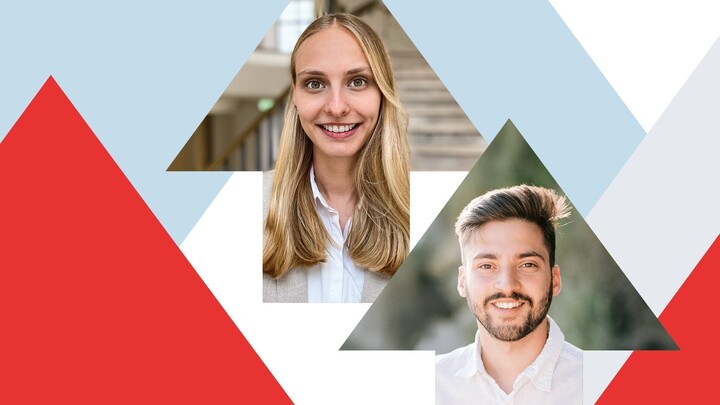Pacific Straws: A Crystal-Clear Alternative
A semester abroad leads to a start-up: After his time in India and learning about the global waste crisis, University of Mannheim student Robert Dehghan knew he wanted to make a difference. Together with his classmate Lara Schnieders, he started producing reusable glass straws—and in 2018, Pacific Straws was born. But where do the two founders stand today?

Piles of trash on the streets, little to no recycling, and a stark realization of how much waste humans generate every day—when Robert Dehghan returned from his semester abroad in Kolkata, India, he was deeply shaken. “Seeing that firsthand gave me a whole new understanding of waste management. In Germany, trash disappears from sight so quickly that we hardly think about it,” says Dehghan, now 28.
Back at the University of Mannheim, he finished his bachelor’s degree in business administration. Discussions with his friends now often turned to waste problems—especially as media coverage on these issues became more common. One story, in particular, caught their attention: a huge garbage patch in the Pacific, nearly four times the size of Germany, much of it plastic. During one of these discussions, Dehghan, his classmate Lara Schnieders, and her sister Corinna had an idea: The sisters’ family owned a specialty glass company—why not create a reusable drinking straw made of glass?
An early market innovation
The first prototypes were made by hand over an open flame. “Friends and family loved them right away,” Dehghan recalls. Initially, their main concern was with sustainability. “Then we realized that glass straws could actually help drive broader social change,” says Lara Schnieders, also 28. Her sister worked in the hospitality industry, where glass straws could serve as a sustainable replacement for disposable plastic ones. Having a family-run production facility gave them additional flexibility. “We had more freedom in designing and manufacturing our glass straws, and we didn’t have to worry as much about financing,” Schnieders explains.
Eventually, the three of them founded Pacific Straws in 2018. “‘Straw’ is the English word for ‘Halm,’ and ‘Pacific’ is a reference to the massive garbage patch in the ocean,” Dehghan explains. At the time, they had only one competitor. The EU’s plastic straw ban wasn’t passed until 2019 and didn’t take effect until 2021. That made Pacific Straws a first mover, meaning they were among the first to bring an innovative product to market, giving them a competitive edge.
Hustling for success
Once the company was founded, the next challenge was finding customers. Starting in mid-2018, Dehghan took on an internship but spent every evening after work visiting bars and restaurants, presenting their glass straws. Meanwhile, Schnieders did the same after her lectures, pitching to the food service industry. “We had no sales experience and broke down the numbers for restaurant owners to show them the financial benefits of switching to glass straws,” Dehghan recalls. Both he and Schnieders learned to tailor their sales pitch to different types of business owners. “Did they care more about how their drinks looked? Cost savings? Less waste? We adjusted our approach for each one, and we learned incredibly fast,” says Schnieders.
Initially, they didn’t just work after hours—on weekends, they traveled across Germany to trade shows, showcasing their glass straws. “For a while, the start-up was our top priority,” Schnieders says. But there were tough moments too. “When you’re passionate about your product, but you still have to convince customers—it’s hard. If they don’t buy, it feels like failure. But you push through,” Dehghan adds. Their enthusiasm is palpable during the interview—they build on each other’s thoughts, share anecdotes, and reflect on their journey. Their passion for glass straws and the energy they have poured into their start-up are unmistakable.
Theory and reality
In 2019, Schnieders and Dehghan both enrolled in the Mannheim Master in Management program. “It was a conscious decision,” says Schnieders. “The University of Mannheim gives you a really solid foundation across all business disciplines.” One particularly valuable experience was a course at the Mannheim Center for Entrepreneurship and Innovation (MCEI). “It helped us refine our business model and provided customized guidance,” says Dehghan. The course also gave them the opportunity to reassess their strategy and long-term vision, things that often got lost in the day-to-day focus on sales.
One of their biggest wins? Partnering with organic supermarket chain denn’s Biomarkt. “Every time I visit one of their stores, I look out for our glass straws—and which of our team members crafted them,” Dehghan says. Each glass straw is handmade, and every package is labeled with the name of the person who crafted it. That personal touch sets them apart from larger competitors, who produce mass-market alternatives at lower costs. “We decided to stay true to our principles: our straws, our packaging, the engraving, the cleaning brushes—everything is made in Germany. Sustainability is what matters most to us,” Dehghan says firmly. This also led them to shift their focus away from individual consumers and restaurants and toward partnerships in the promotional products industry. Companies now use Pacific Straws as a sustainable gift option for their employees, for example.
New paths after graduation
Seven years after founding Pacific Straws, two full-time employees now handle the company’s day-to-day operations. “We’re still involved, but after graduating, we made a conscious decision to step back from daily management,” Schnieders explains.
She now works as a strategic project manager at roadsurfer, whereas Dehghan is pursuing a doctorate at the University of Mannheim while also co-leading his second start-up, ISTARI.AI. “The lessons I learned from Pacific Straws have been incredibly valuable for my new venture,” he says. Still, both founders say they haven’t ruled out the possibility of returning to the business full-time—and expanding its partnerships even further.
Text: Luisa Gebhardt / April 2025
For more about Pacific Straws see the start-up's website.
